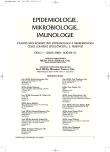-
Medical journals
- Career
Multidisciplinary Approach to the Management of Vulvovaginal Discomfort
Authors: jun. J. Kestřánek 1; V. Buchta 2; J. Špaček 1; M. Főrstl 2; J. Kestřánek sen. 3; P. Jílek 4; V. Matula 1
Authors‘ workplace: Porodnická a gynekologická klinika, LF a FN v Hradci Králové 1; Ústav klinické mikrobiologie, LF a FN v Hradci Králové 2; Soukromá gynekologická ambulance v Náchodě 3; Katedra biologických a lékařských věd, Farmaceutická fakulta UK v Hradci Králové 4
Published in: Epidemiol. Mikrobiol. Imunol. 57, 2008, č. 1, s. 23-27
Overview
Vulvovaginal discomfort is generally the most common reason for visiting a gynaecological clinic. The acute complaints are, in most cases, solved by a gynaecologist himself and the decision procedure is based on possibilities arising from outpatient examination. If need be, the evaluation of wet preparation should be carried out. In many cases we have been confronted with discrepant diagnosis where severe difficulties are not accompanied by relevant development of inflammatory changes and thus the diagnosis gives us an impression of quandary. In this case microbiological examination is the logic solution. With regard to changing living conditions we can expect in the future, that clinical symptoms of vulvovaginitis will not be entirely clear. The overview article points out the possibilities, which a gynecologist is able to use within differential diagnosis in the outpatient department. It also emphasis the necessity of interdisciplinary co-operation, particularly in patients with chronic difficulties where erudite evaluation of fixed preparation and culture examination are beneficial.
Key words:
vulvovaginal discomfort – microscopic examination – cultivation.
Sources
1. Berg, A.O., Heidrich, F.E., Fihn, S.D. et al. Establishing the cause of genitourinary symptoms in women in a family practice. JAMA, 1984, 251, 620-625.
2. Bluestein, D., Rutledge, C., Lumsden, L. Predicting the occurrence of antibiotic-induced candidal vaginitis (AICV). The Family practice research journal. 1991, 11, 319-326.
3. Buchta, V., Špaček, J., Jílek, P. Mykotické infekce ženského genitálu II – diagnóza. Gynekolog, 1997, 6, 173-175.
4. Buchta, V., Špaček, J., Jílek, P. Mykotické infekce ženského genitálu III. Terapie. Gynekolog, 1998, 7, 73-82.
5. Buchta, V., Špaček, J. Mikrobiologické nálezy u pacientek s rekurentní vulvo-vaginální kandidózou ve Fakultní nemocnici Hradec Králové v letech 1995-2002. Česká gynekologie, 2004, 69, 7-14.
6. Čepický, P., Malina, J., Kuželová, M. Terapie aerobní vaginitis a klinicky nejasných příčin vulvovaginálního diskomfortu. Česká Gynekologie, 2003, 68, 439-442.
7. Donders, G.G.G., Verecken, A., Bosmans, E. et al. Definition of a type of abnormal vaginal flora that is distinct from bacterial vaginosis: aerobic vaginitis. BJOG: An International Journal of Obstetrics and Gynaecology, 2002, 109, 34-43.
8. Drake, T.E., Maibach, H.I. Candida and candidiasis: Cultural conditions, epidemiology and pathogenesis. Postgrad Med, 1973, 53, 83-87.
9. Forsum, U., Holst, E., Larsson, P.G., Vasquez, A., Jakobsson, T., Mattsby-Baltzer, I. Bacterial vaginosis: a microbiological and immunological enigma. APMIS: acta pathologica, microbiologica, et immunologica Scandinavica, 2005, 2, 81-90.
10. Főrstl, M., Špaček, J., Buchta, V. et al. Diferenciální diagnostika zánětů pochvy a zevního genitálu, možnosti a limity mikrobiologického vyšetření. Česká gynekologie, 2005, 70, 79-86.
11. Kent, H.L. Epidemiology of vaginitis. Am J Obstet Gynecol, 1991, 165, 1168-1176.
12. Kestřánek, J., Jílek, P., Špaček, J. et al. Chronický vulvovaginální dyskomfort – problematika stále aktuálnější. Sborník abstrakt, 4.Česko-slovenská mezioborová konference lékařské mykologie, Pardubice, 31.5.-2.6.2007, 71.
13. Larsson, P.,G., Forsum, U. Bacterial vaginosis—a disturbed bacterial flora and treatment enigma. APMIS: acta pathologica, microbiologica, et immunologica Scandinavica, 2005, 5, 305-316.
14. Líbalová, Z., Čepický, P., Malina, J., Stanslický, K., Kuželová, M., Medalová, Z., Sosnová, K. Vulvovaginita. Výskyt a význam smíšených a „nezařaditelných“ obrazů. Čes Gynek, 2007, 1, 32-37.
15. MacDonald, T.M., Beardon, P.H.G., McGilchrist, M.M., Duncan, I.D., McKendrick, A.D., McDevitt, D.G. The risks of symptomatic vaginal candidiasis after oral antibiotic therapy. QJM: monthly journal of the Association of Physicians, 1993, 86, 419-424.
16. Reed, B.D. Risk factors for Candida vulvovaginitis. Obstet Gynecol Surv., 1992, 47, 551-560.
17. Špaček, J., Buchta, V., Veselský, Z. et al. Interakce kvasinek s hostitelem ve vztahu k urogenitálnímu traktu, vulvovaginální kandidóza, urologické aspekty mykotických onemocnění. Česká Gynekologie, 2003, 68, 432-439.
18. Špaček, J., Buchta, V. Itraconazole in the treatment of acute and recurrent vaginal candidosis: Comparison of the therapeutic effectiveness and occurrence of relapses in one-day and three-day regimens. Mycoses, 2005, 48, 165-171.
19. Špaček, J., Buchta, V., Jílek, P. et al. What does it mean the diagnosis of recurrent vulvovaginal candidiasis? 9th World Congress for Infectious and Immunological Diseases in Obstetrics and Gynaecology, Urology and Dermatology, Maceio, Brazil, Book of Abstratcs, November 19-26, 2005, 62.
20. Špaček, J., Buchta, V., Jílek, P. et al. Clinical aspects and luteal phase assessment in patients with recurrent vulvovaginal candidiasis. European journal of obstetrics, gynecology, and reproductive biology, 2007, 131, 198-202.
21. Witkin, S.S., Linhares, I.M., Giraldo, P. Bacterial flora of the female genital tract: function and immune regulation. Best Practice & Research Clinical Obstetrics & Gynaecology, 2007, 21, 347-354.
22. Xu, J., Sobel, J.D. Antibiotic-associated vulvovaginal candidiasis. Current infectious disease reports, 2003, 6, 481-487.
Labels
Hygiene and epidemiology Medical virology Clinical microbiology
Article was published inEpidemiology, Microbiology, Immunology

2008 Issue 1
Most read in this issue- Seroprevalence of Toxoplasma gondii among Pregnant Women in Slovakia
- Multidisciplinary Approach to the Management of Vulvovaginal Discomfort
- Detection of Viable Metabolically Active Yeast Cells Using a Colorimetric Assay
- Invasive Pneumococcal Disease in the Czech Republic in 2000-2006
Login#ADS_BOTTOM_SCRIPTS#Forgotten passwordEnter the email address that you registered with. We will send you instructions on how to set a new password.
- Career

